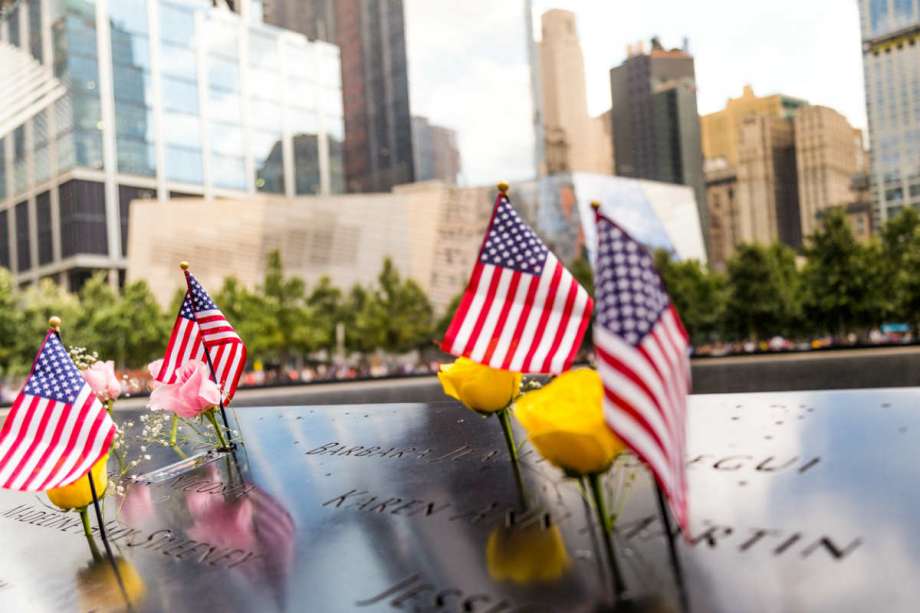Talking to Kids About 9/11 As Part of Their Family History

It was 9:02 am on September 11, 2001, when I watched United Airlines 175, the second plane, fly into the World Trade Center’s south tower. The scenes from the flames, flying debris, and desperate jumpers are indescribable. My first thoughts soared to my cousins who live and work in Manhattan, then to all the people below and around the buildings, then, to my absolute horror, the people who were in the airplanes and still in the towers.
More: An Age-by-Age Guide to Explaining the Death of a Pet to Children
Nearly every American from a certain age can remember what they were doing when the horrific events of 9/11 happened. It was traumatic enough for the millions of Americans who watched, horrified and helpless, from their televisions, but for the people it directly affected—first responders, rescue workers, survivors, and their family members—it paints a completely different story.
For these people, 9/11 is a part of their family heritage, and they don’t hide the fact from their kids.
Don't have time to read it now? Save it for later:

The Emotional Result
Twenty-one years have passed since that fateful day. The toddlers of that time are now entering college, while the teens who experienced so much grief from the loss of a loved one are now getting married and having children of their own.
For some people, extreme emotions are swept under the rug. For others, including the 3,057 children who lost a loved one that day, it becomes a part of their world and the emotional lessons learned are passed on to their own children.
LA Times writer, Laura King, said, “Enduring so private a grief in so overwhelmingly public a context left a mark on all of these children… It looms large over every casual encounter with a new acquaintance. It’s a built-in identity some rejected — and still do — while others have come to accept and even embrace it.”
Dr. Fran Walfish, a family psychotherapist, author of The Self-Aware Parent, and FamilyEducation Expert, says, “The terrifying events of 9/11 were traumatic and can certainly cause PTSD (Post Traumatic Stress Disorder), especially to those who were actually affected personally. This particular event made everyone in the U.S. and the world over, fear that all humanity is vulnerable.”
“People who have personally gone through trauma,” continues Dr. Walfish, “need to talk about their experience over and over and over until the experience is integrated internally.”
Getting Help
Since 9/11, many individuals and families have sought help through organizations such as the World Trade Center Survivors’ Network (WTCS) and Families of 9/11 because they realize the absolute necessity of support and making public appearances to talk about survivors’ experiences.
As Walfish mentioned, and many psychologists agree, talking about the trauma helps to process strong emotions, which will result in healthy conversations with their children. For so many, 9/11 is part of their family heritage as it’s now a story firmly rooted in their family trees.
It has started traditions for many families that result in annual memorial services or a personal celebration that helps the family to breathe life into a massive loss and to continue the promise of remembering.
Being Honest
Talking about traumatic experiences with your children gives them peaceful weapons to deal with information that they might otherwise learn from the news, friends, or other family members.
“It is important to tell your children the truth if you have lost a loved one in the 9/11 tragedy,” says Dr. Walfish. “However, less is more...Your objective is to be truthful while alleviating fears, worries and phobias.”
In a CBS interview with MaryEllen Salamone, widowed from 9/11, and Dr. Robin Goodman, who helped victims to process their grief, they both agree that talking with kids and family about the event is essential.
“Parents naturally want to protect their children from sad and scary things and experiences,” says Goodman, “but it is not necessarily in their best interest. Children do best when parents help them feel informed and prepared for what they will encounter in life—good and bad."
Salmone agrees, “...it's very painful to talk about 9/11. But they don't have the intellectual capacity to figure it out in their heads, and they're looking to you to help them process it.”
Final Thoughts
Dr. Walfish adds, “One of the most challenging issues triggered by a terrorist attack is the feeling of lack of control over our life. Empower your kids by,
- Listening carefully to a child’s fears and worries
- Offering honest clarification and comfort
- Avoiding complicated, confusing, and horrific explanations
- Being sure to monitor your own feelings.”
9/11 is a part of our American culture and history. It shaped lives and family histories for so many and should never, ever be forgotten, ignored, or quelled.
Having a difficult time talking to your kids? Here are 50+ Questions to Get Them Talking.

